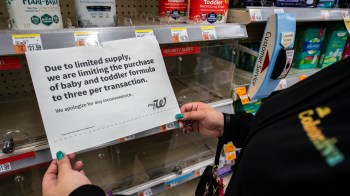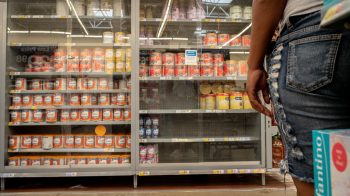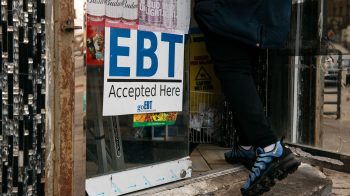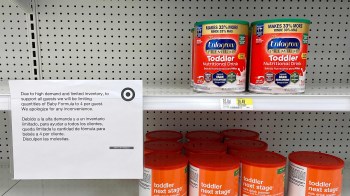WIC stores undergo healthy makeover
TEXT OF STORY
Kai Ryssdal: In this country, one of the biggest federal nutrition programs we have is called WIC. It offers billions of dollars in food vouchers for low-income pregnant women, infants and children, thus the name. Earlier this year the kinds of foods that WIC vouchers would cover was expanded. For the first time they’re good for fresh produce, brown rice, and other more healthy foods in the hopes that children and expectant mothers will change their diets. This switch has put thousands of WIC-certified stores through some changes of their own. Rachel Dornhelm reports.
RACHEL DORNHELM: Friendly Market is a bustling neighborhood store in West Oakland. It has a small deli counter and its shelves are packed with snacks, canned food and bread. Many residents of this low-income area do a lot of their food shopping here.
Owner Mary Kaaid rings up a customer, then walks with me to the second hand produce chiller she bought a few years ago so she could begin selling fresh fruits and vegetables. She shows me some bags of peeled garlic that have just gone bad.
MARY KAAID: See look at this! See these because they are fresh. I’m not going to go for these anymore.
Kaaid says selling produce can be a challenge. Order just a little too much and any profits rot on the shelves.
KAAID: I’ve been throwing a lot away, I’ve been giving away, throwing away, but once the vouchers are in place and then maybe the kids will say this banana is really good, mom, or this is really good, you know.
The vouchers she’s pinning her hopes on are the new WIC coupons. They include more healthy foods like fresh produce, whole grains, even tofu. These new vouchers will be worth billions of dollars in sales. That has some small stores investing in produce chillers, which can cost thousands of dollars and new products to meet the WIC requirements. It’s a gamble. But it’s likely to pay off.
California ran two large test programs in stores ahead of the changes. Laurie True is head of the state’s WIC Association.
LAURIE TRUE: Both pilots showed not only was it easy to administer and very eagerly accepted by the WIC moms, but also these vendors loved it because they saw their produce sales go up and the increased foot traffic coming into their stores increase their overall sales.
Kevin Concannon oversees food programs at the USDA. He says the first priority was changing the diets of women and children receiving WIC. But he says the government is also hoping that access to more nutritious foods will make entire communities healthier.
KEVIN CONCANNON: To the extent that especially these small stores are including these whole grains and fruits and vegetables that can be an access source for other families in those communities.
Kaaid says many of the customers at her corner store could shop at a larger supermarket, but it’s a bit of a trek to get there. And many moms don’t have cars, so they’d have to carry their groceries home. Then there’s the shame.
KAAID: A lot of people tell me it’s like they’re embarrassed when they go to a large store because then people are getting upset, you know waiting in line and have to deal with that. So they don’t want to go there where someone is going to see them get their WIC. So they like to come to a smaller store.
More stores of all sizes are applying for WIC certification. The USDA’s Concannon says in tight economic times they may be attracted by the extra business WIC brings in. The new vouchers will be distributed by the end of December.
In Oakland, I’m Rachel Dornhelm for Marketplace.
There’s a lot happening in the world. Through it all, Marketplace is here for you.
You rely on Marketplace to break down the world’s events and tell you how it affects you in a fact-based, approachable way. We rely on your financial support to keep making that possible.
Your donation today powers the independent journalism that you rely on. For just $5/month, you can help sustain Marketplace so we can keep reporting on the things that matter to you.


















